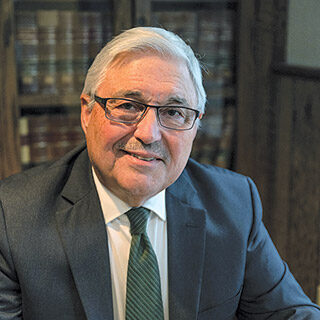 |
If I have been baptized, does that mean I have been anointed?
Answering our question means comparing Old Testament anointing with New Testament Baptism.
Old Testament anointing
The ritual of anointing was widely practiced in the ancient world—both for religious and secular purposes. However, God’s Old Testament people commonly associated anointing with a special mixture of olive oil and herbs that was poured on the head to set a person or object apart for God’s holy purpose. For instance, in 1 Kings 19:16, God commanded Elijah to “anoint Jehu . . . king over Israel” and to anoint Elisha as his successor. When the Lord was establishing Israel’s priesthood, he told Moses to “anoint and ordain” Aaron and his sons. “Consecrate them so they may serve me as priests” (Exodus 28:41). The outpouring of oil was a visible sign before the people that the Lord selected this man and would pour out his blessing upon him for the execution of his office.
Psalm 133 offers a striking word picture of the anointing process: “How good and pleasant it is when God’s people live together in unity! It is like precious oil poured on the head, running down on the beard, running down on Aaron’s beard, down on the collar of his robe. It is as if the dew of Hermon were falling on Mount Zion. For there the LORD bestows his blessing, even life forevermore” (vv. 1-3).
Jesus’ anointing and baptism
We find a connection between anointing and Baptism when we look at the baptism of our Lord. Seven hundred years before John baptized Jesus, God the Father spoke of his Son this way: “Here is my servant, whom I uphold, my chosen one in whom I delight; I will put my Spirit on him” (Isaiah 42:1). Seven centuries later, at the Jordan River, these words were fulfilled. There the Father publicly declared his approval of Jesus for the arduous three-year ministry that lay ahead of him. The Father did not leave his Son alone to fulfill that critical task. As Isaiah prophesied, he also poured out the Holy Spirit upon Jesus when the Spirit descended on him in the form of a dove.
In Acts 10, there is yet another connection between Jesus’ baptism and his anointing with the Holy Spirit. Peter referenced Jesus’ baptism when he taught Cornelius, the Roman centurion: “God anointed Jesus of Nazareth with the Holy Spirit and power, and . . . he went around doing good and healing all who were under the power of the devil, because God was with him” (v. 38). At the waters of the Jordan, the Father poured out on the God-man not oil but the power of the Holy Spirit. The result was that many were delivered from their bondage to Satan.
This unique anointing is why Jesus was given the title “Messiah” in the Old Testament and “Christ” in the New Testament. Both titles mean “the Anointed One.” God’s anointed Old Testament prophets foretold the promised Messiah. Their prophecies found fulfillment in Jesus, who declared, “I am the way and the truth and the life” (John 14:6). Whereas God’s anointed priests offered blood sacrifices repeatedly for the sins of the people, Jesus the Christ ended their office by being both Priest and victim, offering up himself, once for all, on the altar of the cross for the sins of the world. As Israel’s kings of old were anointed to be shepherds and protectors of God’s people of Israel, “all authority in heaven and on earth” (Matthew 28:18) was given to God’s Anointed One to make all things turn out for our salvation here and keep us forever safe in heaven.
But why anoint the Anointed One through baptism? Isn’t Baptism for sinners? That’s what John the Baptist thought. When Jesus presented himself to John for baptism, John initially objected: “I need to be baptized by you, and do you come to me?” (Matthew 3:14). Together with John, we know that Baptism is a sacrament for the forgiveness of sins. Only sinners need apply. But Jesus is the sinless Son of God. He didn’t need this sacrament. Nevertheless, Jesus entered the water of Baptism not to take forgiveness from the water but to “fulfill all righteousness” (Matthew 3:15). By descending into the Jordan, our Savior was fulfilling his heavenly Father’s will. As the Lamb of God, he took away the sins of the world so that our baptism would be “the washing of rebirth and renewal by the Holy Spirit, whom [God] poured out on us generously through Jesus Christ our Savior, so that, having been justified by his grace, we might become heirs having the hope of eternal life” (Titus 3:5-7).
Anointing and baptism today
It is obvious that Christians are not anointed in the same sense as were the prophets, kings, and priests of the Old Testament. We do not live under God’s direct rule as Israel did at that time. Neither did God anoint us to be priests under Moses or kings of Israel. Nor were we anointed in the same sense as was Jesus. He alone was consecrated to redeem a world of sinners.
But because Jesus did this, we who are baptized and believe in our Savior can say that we have been anointed. St. Paul says as much in 2 Corinthians: “[God] anointed us, set his seal of ownership on us, and put his Spirit in our hearts as a deposit, guaranteeing what is to come” (1:21,22). There is no richer comfort than this! Wherever the gospel of Christ is proclaimed, there is the outpouring of the Holy Spirit. And through that Word, the Holy Spirit richly pours saving faith into hearts.
Just think what that means: I belong to God and God is mine. What can anyone do to me? The antidote to the accusations of both our adversary and our guilty consciences is “I am baptized into Christ.” This sacred anointing allows us to stand over a fresh mound of dirt in the cemetery and confidently cry, “Where, O death, is your victory? Where, O death, is your sting? But thanks be to God! He gives us the victory through our Lord Jesus Christ!” (1 Corinthians 15:55,57). The gospel of Christ is the oil of gladness that allows us to say—even through tears—“I believe in the resurrection of the body and the life everlasting.”
Finally, the Spirit’s outpouring of faith gives each Christian a unique way to serve God: “You are a chosen people, a royal priesthood, a holy nation, God’s special possession, that you may declare the praises of him who called you out of darkness into his marvelous light” (1 Peter 2:9).
Baptized into your name most holy,
O Father, Son, and Holy Ghost
I claim a place, though weak and lowly,
among your saints, your chosen host.
Buried with Christ and dead to sin,
your Spirit now shall live within.
(Christian Worship 680:1)
Author: Wayne Laitinen
Volume 110, Number 1
Issue: January 2023





